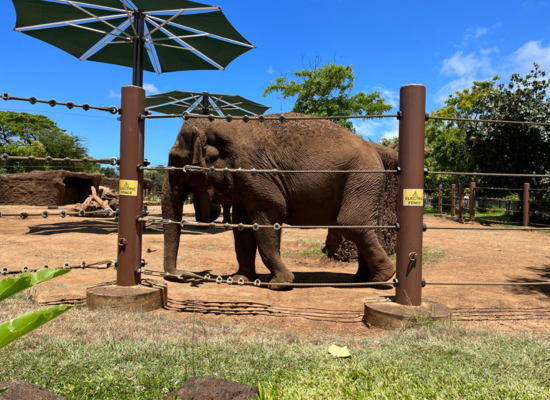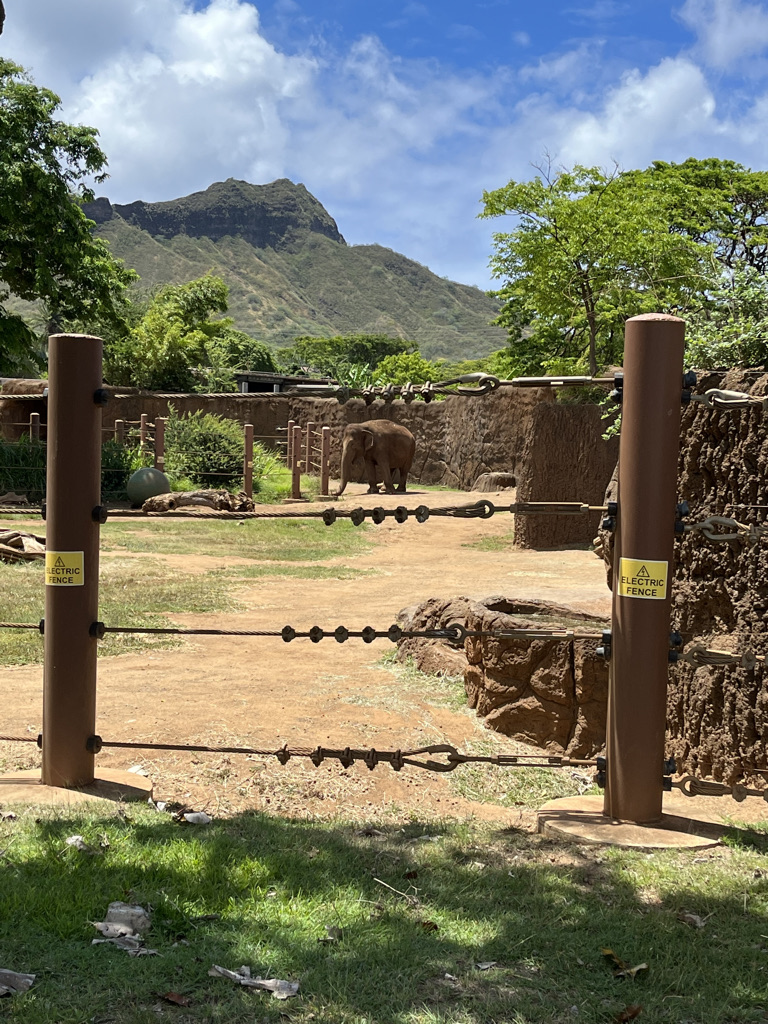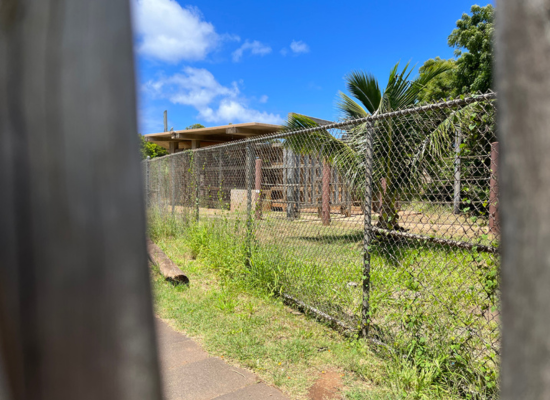
Mari and Vaigai
Mari is an approximately 48-year-old wild-born Asian elephant who was born in India around 1975 and imported to the US in 1982. Vaigai is an approximately 38-year-old Asian elephant who was born in India around 1985 and imported to the US in 1992. Both were torn from their families and natural habitat when they were young and given to the Honolulu Zoo and “the children of Hawaii” as a gift from the Indian government and then Prime Minister Indira Gandhi. According to the zoo, “They are Ambassadors of good will, and serve to increase awareness, education and conservation efforts on behalf of their wild counterparts.”
Like many zoos, the Honolulu Zoo uses the elephants in marketing gimmicks, like picking the winner of the Super Bowl and zookeeper demonstrations. In these demonstrations, the elephants can be observed engaging in stress and trauma behaviors, such as rocking and swaying, not seen in elephants living freely in the wild.
Mari and Vaigai have been the only elephants at the Honolulu Zoo since 1987 when Jothi, a 5-year-old female Asian elephant, died from unknown causes. According to a former zoo director, the Honolulu Zoo has considered bringing in a male elephant to use in captive breeding as well as artificially inseminating the elephants.
Honolulu Zoo Elephant Exhibit
The Honolulu Zoo is a 42-acre zoo that is municipally-owned and operated by the City and County of Honolulu in Hawaii. The Honolulu Zoological Society is a 501(c)(3) that supports the zoo financially and oversees volunteer operations. The zoo lost its AZA accreditation in 2016 due to a lack of adequate and consistent funding. In 2020 the zoo regained its AZA accreditation.
Remodeled in 2011 at a cost of $12 million, the current elephant exhibit has been reported as both 1.4 and 1.5 acres, which is nine times larger than the previous exhibit (making the old exhibit between 0.15 and 0.167 acres). It includes a 7,260 square foot holding area and two pools. There is a shade structure, a rock wall (which appears to be a mix of natural and artificial rocks), and fake rock structures that serve as feeding stations. The substrate is a mix of dirt and patchy grass.
The zoo has been included on In Defense of Animals’ annual list of the worst zoos for elephants in North America four times (in 2009, 2010, 2011, and 2016). According to IDA, “A former chief of the AZA … reported in late 2016 that the elephants were playing with a car battery that they had recently found or dug up … Violations at Honolulu Zoo included too little shade provided for the elephants from the direct sun, inadequately tested and brackish water, a notable absence of habitat enrichment, and unsafe rocks that posed a danger to elephants’ feet.”
In 2011 the zoo opposed legislation that would have required it to provide each elephant with at least one acre of space each. The zoo used bullhooks–a tool used to control elephants through pain and fear of the infliction of pain–on the elephants until 2016.
Who's joined us in the fight
Donate to support the fight
Donate online
Mail a check
611 Pennsylvania Ave SE #345
Washington, DC 20003
Planned giving
Create a fundraiser
Highlights from the fight
Media coverage
A timeline of Mari and Vaigai’s case

10.31.23
The NhRP files a habeas corpus petition in the O’ahu First Circuit Court, demanding the elephants’ right to liberty and release to a sanctuary.
Elephant cognition and behavior experts Keith Lindsay, Lucy Bates, Richard W. Byrne, Bob Jacobs, Karen McComb, Cynthia Moss, and Joyce Poole submit declarations in support of the case.
11.20.23
The City and County of Honolulu Department of Enterprise Services, which oversees the Honolulu Zoo, and the Honolulu Zoo Director file a motion to dismiss the NhRP’s habeas corpus petition.
1.8.24
The NhRP files our opposition to the motion to dismiss filed by the City and County of Honolulu.
1.16.24
O’ahu First Circuit Court Judge G.W. Chang hears arguments on the motion to dismiss filed by the City and County of Honolulu, the NhRP’s opposition to it, and NhRP attorney Jake Davis’s pro hac vice motion. At the conclusion of the 45-minute hearing, Judge Chang grants the motion to dismiss the case. Our statement:
While we obviously disagree with Judge Chang’s decision, we appreciate how probing his questions were, his philosophical approach to the arguments overall, and the fact that he heard arguments at a very early stage in our clients’ case. Judge Chang’s thoughtfulness is an indication of how seriously courts are now taking the issue of nonhuman animal rights. That said, Mari and Vaigai are entitled to have the injustice of their imprisonment remedied through the writ of habeas corpus, which is meant to safeguard the freedom Mari and Vaigai have been denied. We plan to appeal Judge Chang’s decision because the law and the science are clear: habeas corpus isn’t limited to humans, and Mari and Vaigai will continue to suffer until they’re released from their unlawful imprisonment in the Honolulu Zoo and can regain their freedom in an elephant sanctuary.
6.20.24
The NhRP files a Statement of Jurisdiction.
7.22.24
The NhRP files an opening brief in the Hawaii appellate court, demanding the habeas corpus hearing the elephants are entitled to on the lawfulness of their imprisonment.
8.29.24
The zoo files their answer brief.
We file our reply brief on the 23rd.
9.23.24
The NhRP files its Reply Brief.
